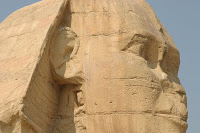Egypt
 Al Ahram Weekly (Jill Kamil)
Al Ahram Weekly (Jill Kamil)
- In The Lab: Laser Scanning The Sphinx
drhawass.com Video. The Sphinx has always been an object of fascination for people for thousands of years. Today, new technology allows us to study it in more detail than ever. We recently cooperated with a team from the Mubarak Scientific City using...
- Sphinx Update Report
drhawass.com With photos. Minister of Culture Farouk Hosni received a technical and ecological report on the health of the Great Sphinx at Giza, which asserted that the Sphinx and surrounding bedrock are safe, and that the groundwater in the area in front...
- Visitors To Receive Protection At Pyramids
ITN There is a news report accompanying the following post on the above page, which has a noisy advert playing at the beginning of it. The ancient monuments are known by tourists as a place where camel riders and trinket vendors hustle visitors relentlessly...
- Interview: Hawass On The Latest Discoveries And Activities In Egypt
guardians.net Many thanks to Fred Sierevogel for sending me the link to this recent inverview with Zahi Hawass (28th July 2008). The interview was conducted by Andrew Bayuk with the assistance of Whitney Bayuk. The website above is the official website...
- Rising Groundwater Threatens Monuments
MCOT English News The fact that variations on this story keeps rearing its head is a sad reflection on the threat to many monuments in Egypt. As well as highlighting the problem at Giza, this piece suggests that solutions have been proposed, but were...
Egypt
Keep an eye on the Sphinx
 Al Ahram Weekly (Jill Kamil)
Al Ahram Weekly (Jill Kamil)The poor old Sphinx. If Napoleonic soldiers aren't using it for target practise, and the desert sand isn't eroding it, then groundwater is eating away at its foundations and now pigeons are using it as a place to hang around and feel good.
While the SCA secretary-general was being interviewed for "Guardian's Spotlight" in July 2008, pigeons were seen pecking away at the eyes and ear cavities of the Sphinx and their droppings were splattered on the stone. Jill Kamil discusses this new danger
Back in 1991 Hawass told Hillary Clinton that the Sphinx was not in danger
The secretary-general of the Supreme Council of Antiquities had much to tell his interviewer on "Spotlight". Zahi Hawass waxed lyrical about "exciting things" that have been happening in the field of archaeology -- the discovery of a new tomb of a queen at Saqqara that has yet to be formally announced; the entrance to two tombs in the Valley of the Kings on which excavation will begin in October; and "big happenings" in Aswan, Edfu and Kom Ombo. He was enthusiastic about the "improvements" at Dendera and the Step Pyramid at Saqqara, and gave details of the new museums at Rashid, Arish, Minya and Amarna, as well as site management at Beni Hassan and Tuna Al-Gabel.
Zahi Hawass raved about the progress on the Civilisation Museum at Fustat and the Grand Egyptian Museum at Giza. Indeed, he also had much to say about the plan to upgrade the Pyramid Plateau and turn it into "a tourist-friendly and hawker-free zone". He mentioned that the project's security component included installing cameras, alarms and motion detectors, as well as building up a 20-kilometre fence.
I wonder if the new electronic security devices, however, while monitoring the movements of tourists and hawkers, cameleers and horse riders, will be able to pick up the unwelcome winged creatures that are finding a comfortable and shady roost in the eye and ear cavities of the Sphinx, and causing damage to the stone with their droppings. Apparently the pigeons are pecking away at this most grand and famous of monuments, finding in it an appetising calcium meal. Back in 1991, after a Save the Sphinx programme of restoration, Hawass declared that the monument was not in any danger. "Its head and neck can live for another thousand years," he declared at the time. He could not possibly have foreseen this newest threat -- the high level of acidity in the droppings of birds and its destructive effect on the stone. Just how serious is the problem?
- In The Lab: Laser Scanning The Sphinx
drhawass.com Video. The Sphinx has always been an object of fascination for people for thousands of years. Today, new technology allows us to study it in more detail than ever. We recently cooperated with a team from the Mubarak Scientific City using...
- Sphinx Update Report
drhawass.com With photos. Minister of Culture Farouk Hosni received a technical and ecological report on the health of the Great Sphinx at Giza, which asserted that the Sphinx and surrounding bedrock are safe, and that the groundwater in the area in front...
- Visitors To Receive Protection At Pyramids
ITN There is a news report accompanying the following post on the above page, which has a noisy advert playing at the beginning of it. The ancient monuments are known by tourists as a place where camel riders and trinket vendors hustle visitors relentlessly...
- Interview: Hawass On The Latest Discoveries And Activities In Egypt
guardians.net Many thanks to Fred Sierevogel for sending me the link to this recent inverview with Zahi Hawass (28th July 2008). The interview was conducted by Andrew Bayuk with the assistance of Whitney Bayuk. The website above is the official website...
- Rising Groundwater Threatens Monuments
MCOT English News The fact that variations on this story keeps rearing its head is a sad reflection on the threat to many monuments in Egypt. As well as highlighting the problem at Giza, this piece suggests that solutions have been proposed, but were...
